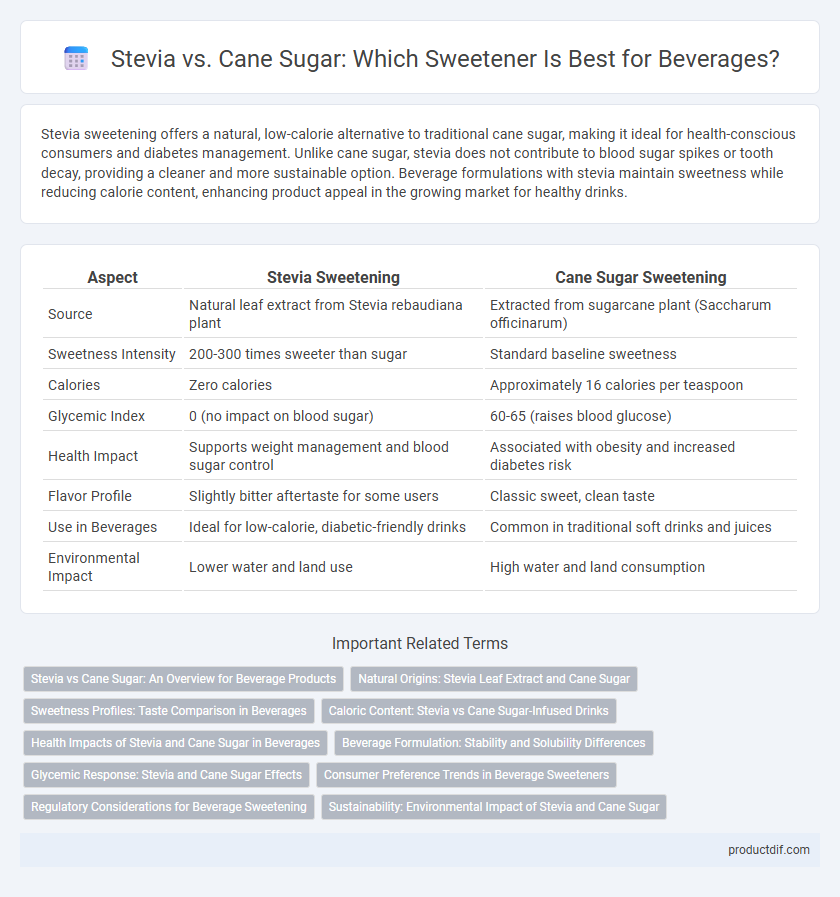Stevia sweetening offers a natural, low-calorie alternative to traditional cane sugar, making it ideal for health-conscious consumers and diabetes management. Unlike cane sugar, stevia does not contribute to blood sugar spikes or tooth decay, providing a cleaner and more sustainable option. Beverage formulations with stevia maintain sweetness while reducing calorie content, enhancing product appeal in the growing market for healthy drinks.
Table of Comparison
| Aspect | Stevia Sweetening | Cane Sugar Sweetening |
|---|---|---|
| Source | Natural leaf extract from Stevia rebaudiana plant | Extracted from sugarcane plant (Saccharum officinarum) |
| Sweetness Intensity | 200-300 times sweeter than sugar | Standard baseline sweetness |
| Calories | Zero calories | Approximately 16 calories per teaspoon |
| Glycemic Index | 0 (no impact on blood sugar) | 60-65 (raises blood glucose) |
| Health Impact | Supports weight management and blood sugar control | Associated with obesity and increased diabetes risk |
| Flavor Profile | Slightly bitter aftertaste for some users | Classic sweet, clean taste |
| Use in Beverages | Ideal for low-calorie, diabetic-friendly drinks | Common in traditional soft drinks and juices |
| Environmental Impact | Lower water and land use | High water and land consumption |
Stevia vs Cane Sugar: An Overview for Beverage Products
Stevia offers a natural, zero-calorie alternative to cane sugar, making it ideal for low-calorie and sugar-free beverage products. Unlike cane sugar, which contributes to higher calorie content and potential blood sugar spikes, stevia maintains sweetness without impacting glycemic index levels. Beverage manufacturers increasingly prefer stevia to meet consumer demand for healthier, clean-label ingredients without sacrificing taste.
Natural Origins: Stevia Leaf Extract and Cane Sugar
Stevia sweetening is derived from the natural leaf extract of the Stevia plant (Stevia rebaudiana), offering a zero-calorie alternative with a sweetening power significantly higher than cane sugar. Cane sugar is sourced from the stalks of the sugarcane plant (Saccharum officinarum), providing a natural carbohydrate-based sweetener with a distinct flavor profile and caloric content. Both ingredients maintain their natural origins but differ in metabolic impact and sweetness intensity, influencing beverage formulation and consumer preferences.
Sweetness Profiles: Taste Comparison in Beverages
Stevia sweetening offers a clean, intensely sweet profile with subtle herbal undertones, providing a zero-calorie alternative to cane sugar in beverages. Cane sugar delivers a rounded, rich sweetness with caramelized notes that enhance flavor depth but adds significant calories and glycemic impact. The taste comparison highlights stevia's lingering aftertaste versus cane sugar's smooth, familiar sweetness, influencing consumer preference based on beverage type and health considerations.
Caloric Content: Stevia vs Cane Sugar-Infused Drinks
Stevia sweetening offers a significant reduction in caloric content compared to cane sugar-infused drinks, with nearly zero calories per serving. Cane sugar contributes approximately 16 calories per teaspoon, leading to increased caloric intake in beverages. Choosing stevia as a natural sweetener supports lower calorie consumption and aids in weight management efforts in beverage choices.
Health Impacts of Stevia and Cane Sugar in Beverages
Stevia offers a natural, zero-calorie alternative to cane sugar, significantly reducing the risk of obesity, type 2 diabetes, and dental cavities commonly associated with high sugar intake. Unlike cane sugar, which elevates blood glucose levels and contributes to metabolic syndrome, stevia contains steviol glycosides that do not affect insulin response. Incorporating stevia in beverages supports better glycemic control and promotes overall cardiovascular health compared to traditional cane sugar sweetening.
Beverage Formulation: Stability and Solubility Differences
Stevia sweeteners exhibit superior solubility and stability in beverage formulations compared to cane sugar, ensuring prolonged shelf life and consistent taste profiles. Unlike cane sugar, which can crystalize and degrade under certain storage conditions, stevia maintains clarity and sweetness without promoting microbial growth. These stability and solubility advantages make stevia an increasingly popular choice for clean-label and low-calorie beverage products.
Glycemic Response: Stevia and Cane Sugar Effects
Stevia significantly lowers glycemic response compared to cane sugar, making it an ideal sweetener for people managing blood sugar levels. Unlike cane sugar, which causes rapid spikes in blood glucose due to its high glycemic index, stevia contains non-caloric compounds that do not affect insulin production. Studies show stevia's zero glycemic impact supports better metabolic health and reduces risks associated with diabetes and obesity.
Consumer Preference Trends in Beverage Sweeteners
Consumer preference trends in beverage sweeteners increasingly favor stevia due to its natural origin and zero-calorie profile, appealing to health-conscious individuals. Market data reveals a surge in demand for stevia-sweetened beverages as consumers seek alternatives to cane sugar to reduce calorie intake and avoid blood sugar spikes. Despite this, cane sugar remains popular for taste fidelity, though its market share is gradually declining amid rising awareness of sugar's health impacts.
Regulatory Considerations for Beverage Sweetening
Stevia sweetening in beverages is subject to strict regulatory guidelines, with agencies like the FDA recognizing purified steviol glycosides as Generally Recognized As Safe (GRAS) for use as a sweetener. Cane sugar, being a natural and traditional sweetener, faces fewer regulatory restrictions but is increasingly scrutinized for health-related labeling requirements, including sugar content disclosures and added sugar warnings. Compliance with regional standards, such as the European Food Safety Authority's (EFSA) regulations for stevia and sugar labeling, is critical for manufacturers in global markets.
Sustainability: Environmental Impact of Stevia and Cane Sugar
Stevia sweetening offers a significantly lower environmental impact compared to cane sugar due to its minimal water usage and reduced land requirements. Cane sugar cultivation contributes to deforestation, high water consumption, and greenhouse gas emissions from fertilizer use and processing. Sustainable beverage production increasingly favors stevia for its eco-friendly profile and potential to reduce carbon footprints.
Stevia Sweetening vs Cane Sugar Sweetening Infographic

 productdif.com
productdif.com